Thekchen Chöling, Dharamsala, HP, India - Once His Holiness the Dalai Lama had taken his seat this morning, he was welcomed to today’s virtual conversation by Dr Anupam Sibal, President of the Global Association of Physicians of Indian Origin (GAPIO) and Dr Akshay Anand, Professor, PGIMER, Chandigarh, representing the India Yoga Association. Dr Sibal suggested that due to the stresses of the current pandemic healers need compassion. Dr Anand added that many people working in the medical field around the world would be joining the session.
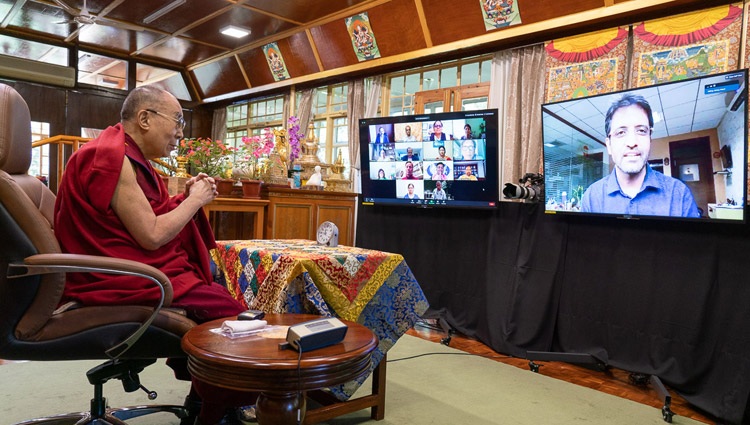
“Thank you,” His Holiness responded, “It’s indeed a great honour for me too to hold discussions with scholars and professionals like you. I learn a great deal from such exchanges. A renowned Tibetan scholar once observed that until we attain Buddhahood, each of us is a student ready to learn something new.
“Now, as far as health is concerned, it relates not only to our bodies, but also to our minds and emotions. The practice of compassion and altruism brings us peace of mind. Even if we face trouble or someone is critical of something we’ve said or done, compassion enables us to feel grateful to them. Compassion is the best counter measure to anger, anxiety and so forth.
“Physically the practice of yoga and breathing exercises can calm our heart rate. There are simple practices like the nine-round breathing, which I do, and which have a calming effect. These practices are described in Indian spiritual texts, but we can apply them in an objective, secular way to relieve anxiety and improve our physical health.
“Over the last few decades, I’ve had a series of discussions with scientists, mostly from the West. They’re largely concerned with the study of material things, but have become increasingly appreciative of ancient Indian knowledge of the workings of the mind and emotions. Until the end of the 20th century scientist focussed on the brain with little thought about the mind and our inner world. With the discovery of neuroplasticity this has begun to change.
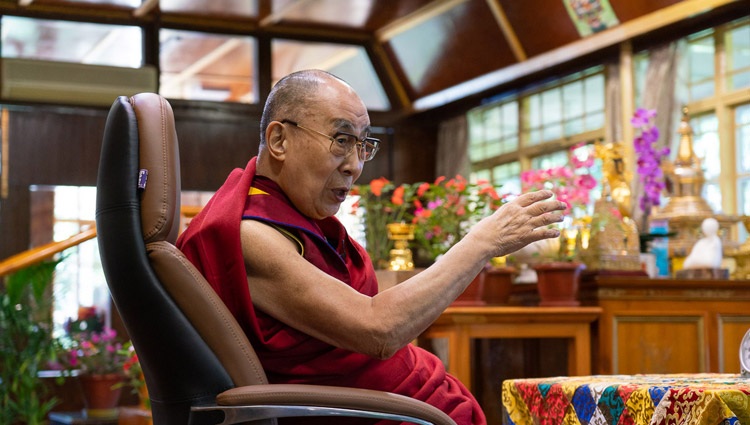
“In the past, we’ve learned to observe physical hygiene to protect our physical health. What we’re learning today is that to preserve our peace of mind, we need to adopt the principles of emotional hygiene. This is why I believe there are benefits to be had from combining modern education with ancient Indian knowledge.”
His Holiness noted that everyone wants to live a happy life in a peaceful world, but, at the same time, we face a lot of problems that are our own creation. Reducing them is up to us. What is important, he emphasized, is education, especially about how to cultivate peace of mind.
“In this country, we have the ancient traditions of ‘ahimsa’ and ‘karuna’ — non-violence and compassion — that have emerged from practices for developing a calmly abiding, concentrated mind and wisdom. What ancient Indian knowledge also has to tell us about tackling our destructive emotions can be very useful.
“In the 20th century Mahatma Gandhi promoted the practice of non-violence as part of a political struggle. He impressed and influenced many people who came after him, such as Archbishop Desmond Tutu, Nelson Mandela and Martin Luther King. Another aspect of this tradition is that cultivating ‘karuna’ or compassion is the way to develop peace of mind, not necessarily as a spiritual goal but as part of a secular training of the mind. I sometimes wonder if Mahatma Gandhi could not have paid a little more attention to this and the development of a more complete education.”
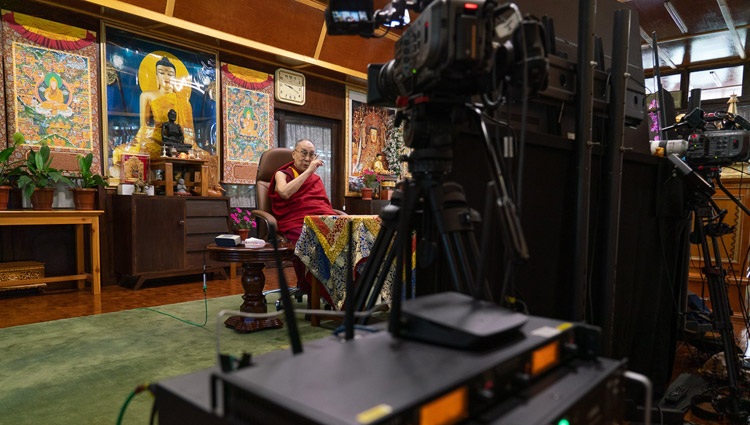
His Holiness remarked that Indian nuclear physicist Raja Ramanna had once mentioned to him that quantum physics was something new to the West. However, the thought behind it corresponded closely to what Nagarjuna was writing about centuries ago. Nagarjuna was a pioneer of the Nalanda Tradition that is characterized by scrupulous investigation on the basis of logic.
“Cultivating peace of mind should part of our approach to health. Doctors and nurses need it too. It’s important to put the patient at ease. Whenever I go for a medical check-up, I’ve noticed that I feel much more comfortable if the doctors and nurses looking after me treat me with warm fellow feeling and a smile.”
His Holiness invited members of the audience to put questions to him and the first was about how to help those who have given up hope.
“I think that if you have exaggerated desires and a short-sighted outlook,” he responded, “it is possible to lose hope. However, our human mind enables us to take a more holistic view of what’s happening to us. In a larger, cosmic context we know that whole galaxies ultimately disappear. As human beings we will face hardship in our lifetimes, but because we’re intelligent, we can find ways to overcome the problems that confront us.
“If you focus narrowly on the problem as you see it, you might well lose hope, but if you look at it from a wider perspective, it’s easier to be more positive. In my own life, the situation in Tibet became really difficult in early 1959. On 17th March, when I decided to escape, we set out not knowing if we would live to see the following day — but I never gave up hope. It’s important to keep up your determination, so when the sun rose on 18th March, I felt much better. “
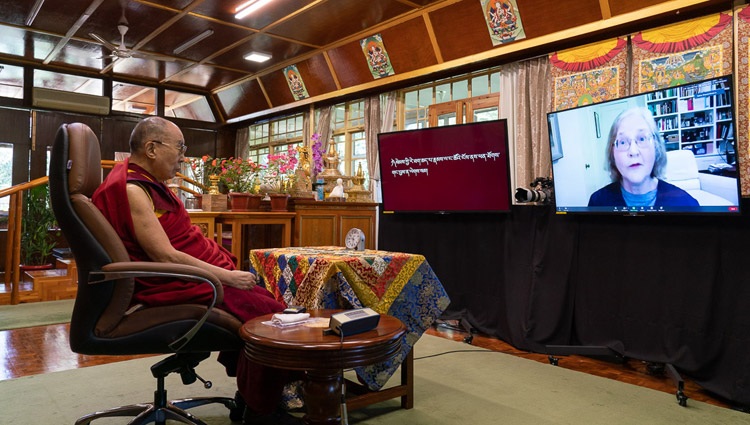
A question was asked about animal markets, industrial farming and human health. His Holiness replied that if you examine human teeth and finger nails, it seems that human beings, like deer, are more suited to eating a vegetarian diet. Lions and tigers, on the other hand, are equipped with the strong sharp teeth and claws necessary to eat raw meat.
“There are places, however, like the great plains of northern Tibet where there are no vegetables or fruit and the only food available is meat and dairy products.
“In this country, many people are vegetarian and Indian vegetarian food is excellent. I’ve noticed though that when I first came here there was almost no poultry industry. Now it is much in evidence. It’s common to see cages packed with chickens in markets and outside restaurants awaiting slaughter. It would be better to improve the supply of vegetables and fruit. Scientists say that beef farming and rearing meat in general is damaging to the earth’s ecology.
“Fish are a different issue. Many people seem to think that fish have no feelings of pleasure or pain. They depend on fishing for their livelihood, but regard the fish they catch as not much different from vegetables. Where there is no option but to eat meat, there is nothing to be done. But where we can, it’s good to try to reduce the farming and consumption of meat.
“In 1964, I decided to become a vegetarian. Shortly afterwards, when I visited Japan, my elder brother teased me about it. After about 20 months, I fell ill and developed jaundice. It was then that my doctors advised me to restore some meat to my diet to aid and support my recovery.”
Asked how faith and religion can be explained to children, His Holiness observed that despite their variant philosophical views, all major religious traditions convey a message of love and compassion, tolerance and forgiveness. Whether you accept religion personally, he said, this essence of religious teaching is relevant in today’s world.
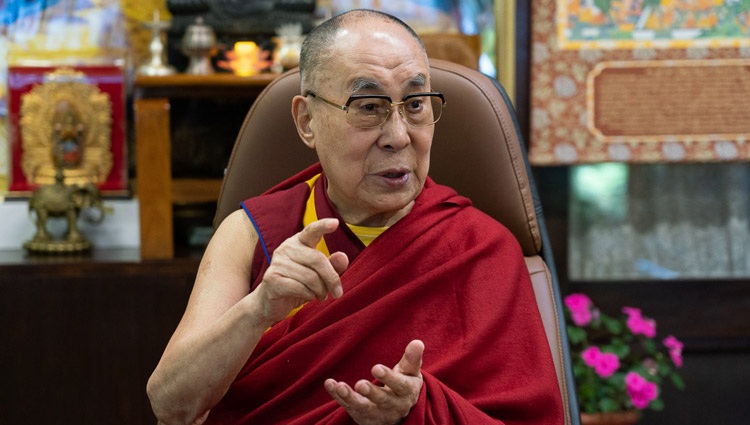
“Ask children if they prefer their mother’s smiling or frowning face. Naturally they will tell they prefer her smile. My first teacher of compassion was my mother and one of the things about her was that she always showed us a kind face. Ask children whether they feel more comfortable when their teachers smile or when they are stern. They’ll tell you that they feel a teacher who smiles has real concern for their welfare.
“If children only sharpen their brains at school, there’s no guarantee they won’t go on to make trouble. To balance their keen brains, they need a warm heart. The more compassionate they learn to be, the more useful members of society they’re likely to become.”
Invited to advise traumatized health workers, His Holiness began by declaring his admiration for doctors and nurses who have been treating people ill with covid-19.
“They show such courage,” he continued, “and some have even sacrificed their own lives. I truly admire them. This illness is really unfortunate, but I always try to look at things from a more holistic point of view. Ancient Indian scriptures record that humanity will eventually disappear as we pass through periods of violence, sickness and famine.
“In the previous century war was rife. Too many people thought that the use of weapons was a source of power. But this is outdated thinking that can be traced back to feudal attitudes. The use of force in a democratic world is completely out of date. Therefore, we really must exert ourselves to make this a century of dialogue, a time when we find mutually agreeable solutions by talking to our opponents.
“There are doctors and nurses, who are determined to help those suffering in this pandemic, despite the danger. They are enthusiastic and full of concern for their patients. I believe that their inner strength affords them some protection. It’s important that they remain brave and self-confident. Similarly, scientists, who are conducting research, must retain their resilience as they employ their professional skills.
“I take great inspiration from the advice of an eighth century Indian Buddhist master who recommended that whatever the circumstances, we should try to see things clearly. If there is a problem, we must look to see if it can be overcome, and if it can, that is what we should do. If it can’t be overcome, worrying about it further will be of no help.”Source : https://www.dalailama.com/news/2020/compassion-in-medical-practice
![kristof Gabriel carina van hooymissen [my ancestor lieven once brewed the beer saint-michael]](https://blogger.googleusercontent.com/img/b/R29vZ2xl/AVvXsEiuf5AId3Z3RVqmJkfVPVXsz_-LO89rYUHadTXsJnXUtENc6Q3DYO4cH6Ii3cJfHvIOyYLuyB4usNk9rXPfKXqGqnUPGe6D30imXQzsKAEvPnR478_6_CpifikjSMW-V0GLBp8BWPUB_B32/s250/Red+PIll.jpg)

Geen opmerkingen:
Een reactie posten